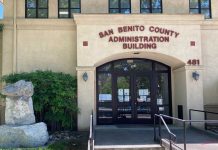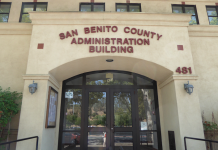The federal government filed a lawsuit Wednesday that concluded
San Benito County violated minority voting laws by not offering
proper Spanish-speaking materials in March and named a laundry list
of directives that would overhaul how the Elections Office does
business.
The federal government filed a lawsuit Wednesday that concluded San Benito County violated minority voting laws by not offering proper Spanish-speaking materials in March and named a laundry list of directives that would overhaul how the Elections Office does business.
The Department of Justice filed the suit in the U.S. District Court, San Jose after civil rights inspectors observed San Benito’s operations during the March 2 election. That scrutiny stemmed from complaints received by the local chapter of the League of United Latin American Citizens.
Federal officials claim the Elections Office didn’t follow requirements outlined in the Voting Rights Act of 1965 and the Help America Vote Act of 2002 (HAVA).
Those included failing to provide Spanish registration forms, bilingual ballots, adequate assistance from Spanish-speaking poll workers, volunteer training in Spanish, signs at polling places in both languages and any information on voting rights.
The county also must employ a bilingual election program coordinator and “investigate expeditiously” all allegations of poll worker hostility toward Spanish-speaking voters, according to the suit.
Sample ballots have been printed in both English and Spanish, but official ballots were in English only, Hodges said, because the county’s equipment was not yet capable of producing both forms.
“My feeling is that we have two languages here,” Hodges said. “Both languages will have all the tools necessary to place a vote.”
President-elect of the local LULAC chapter, Ruben Lopez, said there would be a press conference today to announce the findings. He hadn’t known details of the suit, but he was pleased that action was taken.
“I’m glad somebody looked into it,” said Lopez, whose presidency takes effect June 5. “There is a discrepancy here obviously, or they wouldn’t have found an opportunity to file a lawsuit.”
Elections officials Wednesday vowed to adhere with all conditions in the suit, which would avoid any possibility of expensive litigation. But the changes would come at a hefty price as the county braces for major budget cuts, according Hodges.
It’s too early to estimate how much extra funding would be necessary for the changes, but he wants two more full-time positions in order to comply, Hodges said. The Elections Office budget in 2003-04 was $477,000.
Hodges defended violations of the HAVA regulations – an array of required postings and materials in Spanish – because San Benito has been subject to those laws only since January. His office had been far into the planning stages for the March election, which normally take about six months, by that time, he said.
Plus, he feels most other counties aren’t in full compliance, and that San Benito is being used as an example for other jurisdictions to follow.
“I feel we’re going to be set up as a model,” Hodges said. “It sounds like they want all (California) counties to comply.”
He went on: “The federal government wants it. It’s going to require a lot more steps.”
Federal officials announced the filing and San Benito’s compliance Wednesday afternoon. Assistant Attorney General Alexander Acosta commended local officials in a press release for promptly agreeing with the suit’s conditions.
Since the HAVA legislation passed in 2002, the Civil Rights Division of the DOJ has been working with state and local elections officials to implement the new requirements.
Federal observers came to San Benito for the March 2 election after hearing complaints from LULAC; state president Mickie Luna lives in Hollister.
A handful of inspectors, who gave Hodges about two weeks notice, visited the county’s polling places. Hodges said they denied receiving any complaints, and rather that they were checking up on the new regulations.
They examined materials and watched how volunteers functioned. Afterward, the Elections Office received some complaints from poll workers who felt “very uncomfortable” with their presence, Hodges said.
Kollin Kosmicki can be reached at 637-5566, ext. 331 or at
kk*******@***********ws.com.









